The third mobilization of the French working class since the beginning of this year, the general strike is supported by "69 percent of the French, according to a survey by polling company CSA for the communist L'Humanite daily" (emphasis added, Gabriele Parussini, "French Unions Call Strike March 10 on Workweek, Wages (Update1)," Bloomberg.com, March 8, 2005).
Rail tracks are deserted near the Saint-Jean station at the start of a 24-hour nationwide strike by employees of the state run railroads SNCF in Bordeaux, south-western France, March 10, 2005. French labor unions called for nationwide protests and a day of general strikes to defend the 35-hour work week. (Regis Duvignau/Reuters)
Women lead a group of demonstrators as tens of thousands of protesters march through Paris, answering the call of unions for a massive turnout to defend France's 35-hour workweek and to push for more jobs and salary talks, Thursday March 10, 2005. Protests nationwide drew big crowds. (Francois Mori/AP)
Some of tens of thousands of protesters march through Paris, answering the call of unions for a massive turnout to defend France's 35-hour work week and to push for more jobs and salary talks, Thursday March 10, 2005. Protests nationwide drew big crowds. Banners read: Olympic games in seven years, salaries now. (Francois Mori/AP)
Students demonstrate against education reform in central Paris, March 10, 2005 as they joined nationwide protests on a day of general strikes to defend the 35-hour work week. (Jack Dabaghian/Reuters)
A French high school student holds a sign which reads, 'Fillon we will destroy your Law' as she shouts protest slogans asking the French Education Minister Francois Fillon to retract his law proposal intended to modify the evaluation process for the French baccalaureat diploma or 'bac' at a demonstration in Paris, February 15, 2005. (Jacky Naegelen/Reuters)
Researchers demonstrate with posters as scientists nationwide are protesting over a draft law that would provide more state funding for research but which protesters contend remains inadequate, Wednesday March 9, 2005 in Paris. Poster at left shows Marie Curie and reads: 'They became crazy'. At right, a poster of Frederic Joliot and reads: He Stayed in France. (Francois Mori/AP)
Defense of the 35-hour work week is one of the most urgent demands of French workers. The National Assembly, the lower house of the French parliament, "voted 370-180 allowing private-sector employees to swap time off for more money, letting them work more than 35 hours a week" on February 9, 2005 (Francois de Beaupuy, "French Lower House Loosens 35-Hour Work Week Law (Update2)," Bloomberg.com, February 9, 2005) -- a measure approved by the Senate on March 4 (Robert Stevens, "General Strike in France as Workers Continue Protests against Raffarin Government," WSWS.org, March 11, 2005). While the 35-hour week, initiated by a Socialist parliament in 1998, had already been eroded by the changes made in 2003 and 2004, the new law represents a far more dramatic attack on workers' right to leisure, allowing "employees to work beyond the 220-hour overtime limit and up to 48 hours a week if they volunteer" and letting "companies buy back days off that workers don't want and extend for three years a reduced rate of overtime at businesses with fewer than 20 people" (Beaupuy, February 9, 2005). A large majority of the French do not want longer hours: "A survey by polling company Ifop published in Le Journal du Dimanche showed Jan. 30 that 77 percent of 959 respondents would prefer to leave their working time unchanged" (emphasis added, Beaupuy, February 9, 2005).
And why should they? At the same time as increasing workers' quality of life, the 35-hour week succeeded in creating a modest number of new jobs:
Moreover, shorter work hours are a spur to productivity growth in the long term. "Starting in 1950, hours per employee in Europe dropped faster than in the U. S., while the employee/population ratio plummeted during the 1973-92 sub-interval," while "Europe achieved much faster productivity growth in 1950-73 and 1973-2000 than did the United States" (Robert J. Gordon, "Two Centuries of Economic Growth: Europe Chasing the American Frontier," March 30, 2004, pp. 7, 9). Not only do shorter work hours, invigorating workers, boost productivity; they, in combination with good labor laws that empower the working class, also give management a strong incentive to make capital investment to raise productivity: "In 1946, the [capital-labor] ratio in the US was three times higher than in Europe [Germany, France, and the United Kingdom]. By around 1990, the European ratio surpassed that of the United States and continued to grow faster than in the United States" (Gérard Duménil and Dominique Lévy, Capital Resurgent: Roots of the Neoliberal Revolution, trans. Derek Jeffers, Cambridge: Harvard University Press, 2004, p. 39-40). That's certainly a better bargain for the working class than the American bargain of trading longer hours and higher labor force participation at slower productivity growth for only a slightly bigger real GDP per capita (Gordon, "Figure 1: Per Capita Real GDP, Europe and the United States, Selected Years, 1820-2000," p. 54).
Source: Gunnar Trumbull/Center on the United States and France, "France's 35 Hour Work Week: Flexibility Through Regulation," U.S.-France Analysis, January 2001

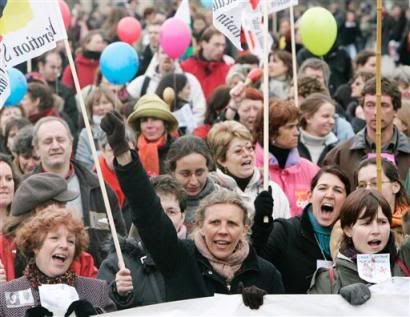
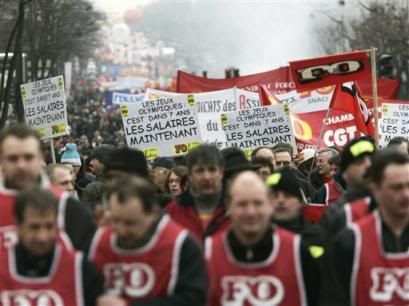

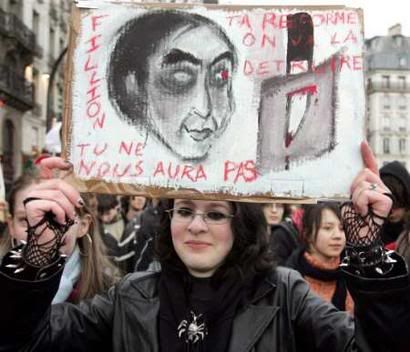
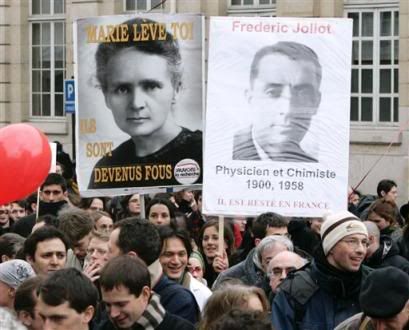
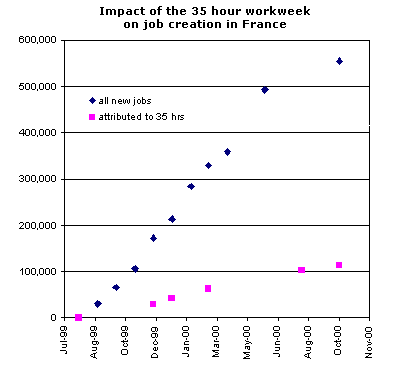




No comments:
Post a Comment